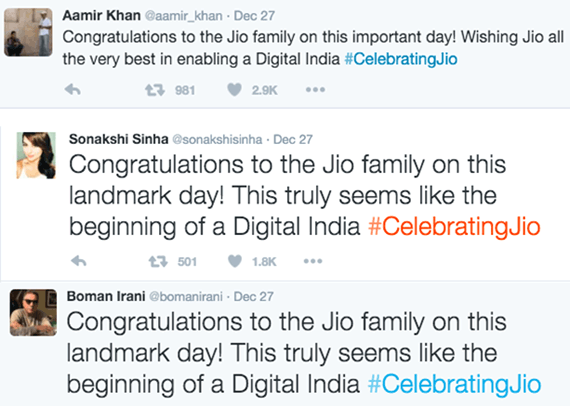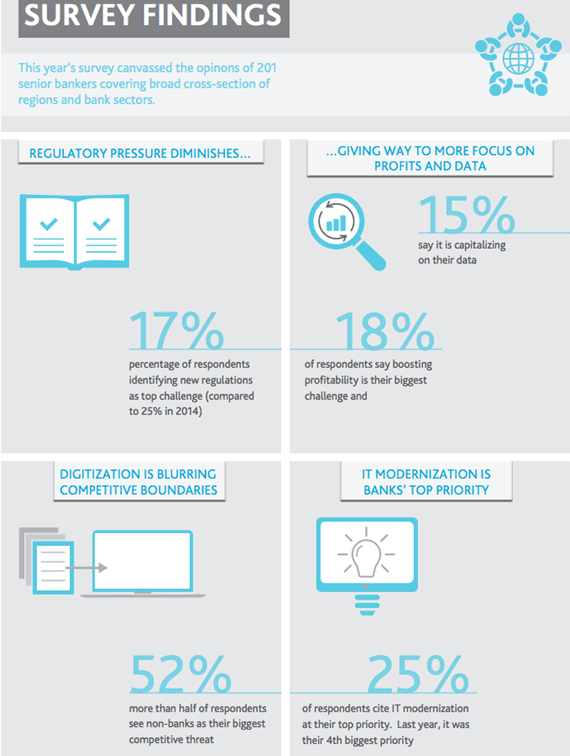The difference between digital communications and a digital strategy
PR Insight
Paarul Chand
In late December, ‘Reliance Jio’ was trending worldwide, but not entirely due to the ‘soft launch’ of the company’s 4 G service. Some bright spark had issued identical “influencer tweets” to a galaxy of film stars:

The result was some great trolling of the new service. The fact that it’s a 4G service doing the cut and paste digital marketing job, makes the goof up even more deliciously ironic. Traditional companies in India are still grappling with social media and digital marketing, whereas companies like Uber India are already offering bookings via Facebook Messenger.
Karan Bhandari, director digital for Weber Shandwick in India, says that traditional businesses need to learn, “What is the shift in paradigm that you expect from your business or service offering. The disruption in communication comes from being able to anticipate and deliver what the consumers will need in the near future. The successful delivery of this disruption, however, is to not just to give a product but package it into an experience.”
Customers today want more than just a product, their experience with the product matters equally if not more. And all of this needs to be communicated quickly.
Bhandari points out that, “Uber went from a mere taxi to offering the experience of a "personal driver".” Uber was also quick to cash in on the Delhi Government order of allowing cars with odd/even numbers into the capital city on alternate days to control pollution.
Says Bhandari, “Uber took an idea that is looked down upon in India – car sharing – and turned this, the ‘product’ of car sharing/ fare split into an on- demand service to show convenience to meet the government's order.”
According to Bhandari, Uber’s fare split approach for Delhi is being positioned not as a product but as a convenience-led experience.
Part of the challenge traditional businesses face with this is understanding where digital fits into their business.
“Traditional businesses need to internalize a thought leadership approach towards digital marketing. Content is bound to play a key role in this approach”, says DC Priyan, business head - south at Value 360 Communications.
Gap between traditional and new age business is closing
As traditional and new business begin to operate in the same space, as can be widely seen in the retail sector; old businesses will have no choice but to catch up with digital methods.
T. Anand Mahesh, co-founder and managing director, Mavcomm Consulting Pvt. Ltd. says that while communication strategies can’t be guided by what the competition is doing, “The differentiation between traditional businesses and new age businesses is declining at a very rapid pace. There is no doubt that traditional businesses have survived and grown so far by not only adopting to latest changes affecting their business but mainly because of their core focus on managing customer needs and expectations.”
Future Group, which faces tough competition from e-tailers such as Flipkart and Amazon, is one such firm that is using a digital approach to reinvent itself. Recently, the group’s founder and CEO Kishore Biyani shared that the company vision is to act like a start-up. A half dozen apps tracks business growth as well as supports employees with information and opportunities for training.”
Other sectors such as financial services are also trying to fight of the challenge from fin tech companies. According to a survey titled ‘Shifting Sands: Banking in the Digital Era, brought out Temenos in association with Capgemini, IT is the top priority of bankers surveyed:

While local banks such as Axis have nimble mobile apps, there is still a lot more to do in terms of digital marketing communications.
Bhandari says with 4 G on its way, “The very way we access information will change. This means there will be a slew of changes in the app ecosystem which will change the way we communicate within ourselves as well as how brands talk to us. Video is going to be bigger than it ever was.”
Bhandari also points to the rise of messenger services, who will become the defacto content consumption engines on their way to get monetized by way of services.
“FB messenger is making fast inroads into this. Twitter is already working on a delivery model for food delivery. These brands are poised for big disruption in the communications space. Smarter ones, will try to monopolize on the existing user analytics for a more personalized customer experience. “
If you enjoyed this article, you can subscribe for free to our weekly event and subscriber alerts.
Featured

PR professionals share their views on journalists publicly calling them out on story pitches

Auto blogger renders unconditional apology to Value 360 for defamatory posts

Hottest Indian startups of 2020, Paytm, Dreams 11 lead the charge: Wizikey Report




